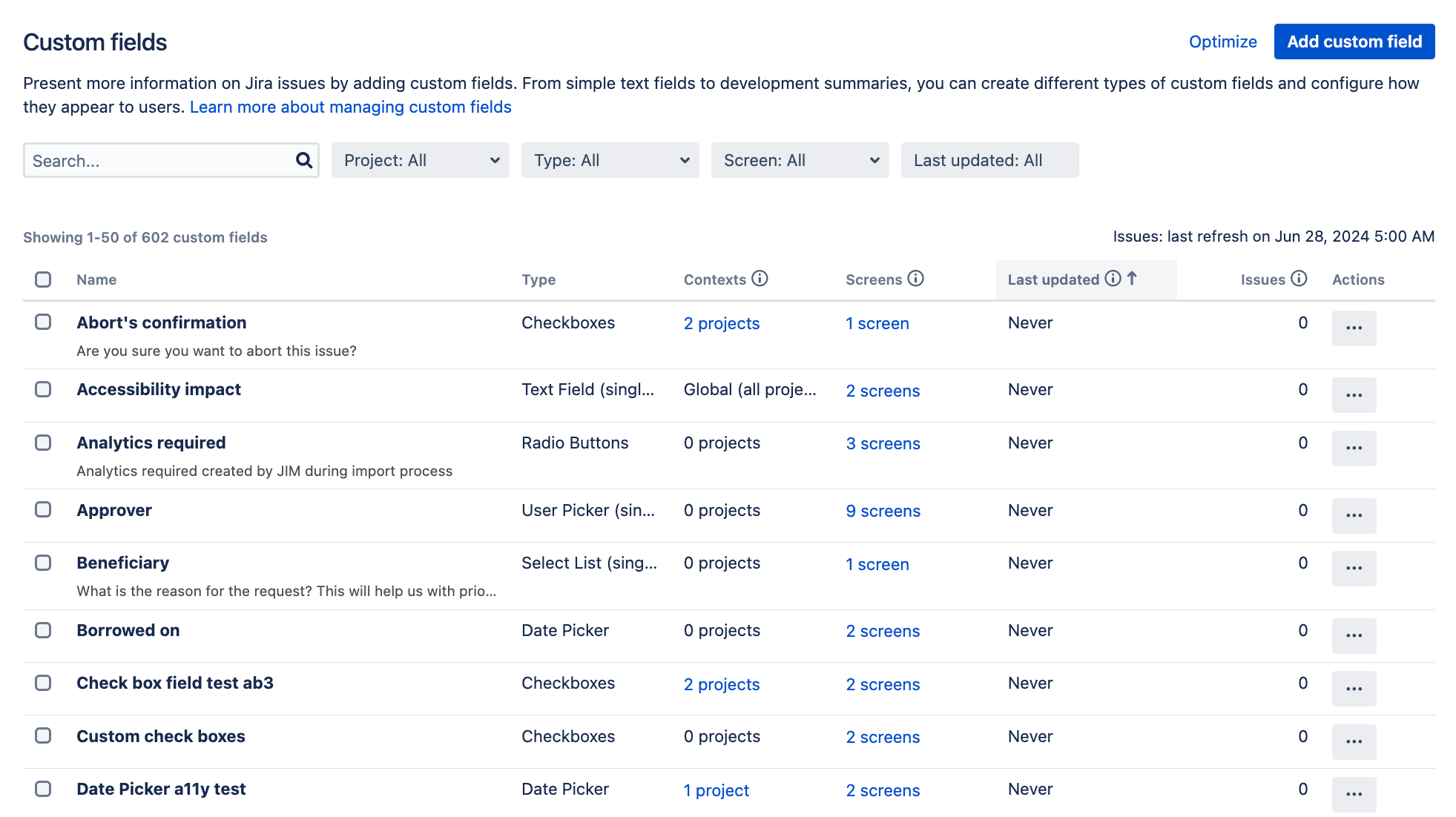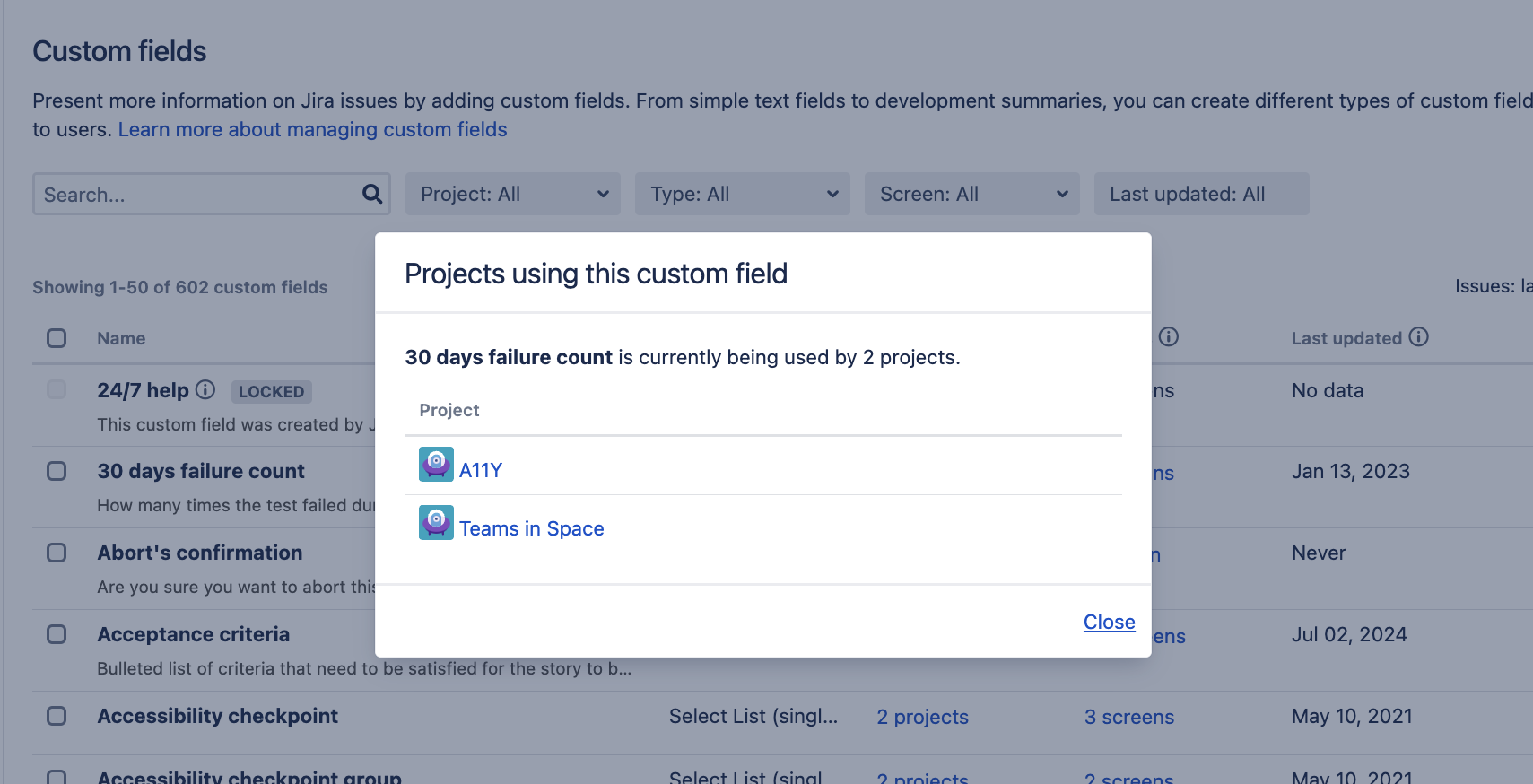Too many custom fields
This insight is shown when your total number of custom fields exceeds 24,000.
Why is there a problem with too many custom fields?
Having too many custom fields in total can affect Jira speed and responsiveness. This is not a hard limit – you can exceed it, however we feel the recommended max reflects where your site will begin to experience degraded performance. We’ve chosen the value based on our performance data.
What’s the recommendation?
Your goal is to reduce the number of custom fields below the limit.
Here are some actions you can take:
Delete unused custom fields
Clean up custom fields
Optimize custom field context
Use the site optimizer after migration
Delete unused custom fields RECOMMENDATION
Identify unused custom fields
When viewing this recommendation from the dashboard, copy the SQL query and run it on your database.
The SQL query returns custom fields with:
0 screens
0 issues storing a value for the field
Such custom fields aren’t used anywhere and never have been, therefore are the best candidates for deletion.
Delete unused custom fields
To delete unused custom fields.
Go to Administration > Custom fields.
Search for the fields returned by the SQL query.
Delete the custom fields.
You probably have more custom fields that are unused and could be deleted, but you’ll need to manually analyze them. We’ve described in other recommendations.
Clean up custom fields RECOMMENDATION
View custom field usage
When viewing this recommendation from the dashboard, select the first View custom field usage in Jira link. Alternatively, you can go to Administration > Custom fields.
You’ll be moved to the Custom fields page in your Jira instance where you can analyze the usage by checking the following fields:
Contexts
Screens
Last updated
Issues
Analyze custom field usage
Use the following columns and sorting on the dashboard to find good candidates for deletion.
Issues
The column shows you the number of issues that store a value for your field and includes both issues with default values and archived issues.
Last updated
The column shows you the last time a value for a custom field has been added or updated in any issue, but it doesn’t include default values—as in, the user must actively choose or add a value for this field.
Contexts
This field is useful for cleanup if the context is project-specific, which allows you to see the number and importance of projects that are using this field. If most of your fields have global context, you can first use the Custom field optimizer to narrow it down to specific projects.
Screens
Shows the screens where your custom field is displayed, like a Create issue screen or Default issue screen. The number of screens using your custom fields, and what screens those are, should help you decide whether it’s really needed.
Clean up custom fields
Once you’ve identified custom fields that could be cleaned up, delete them from the Custom fields page.
There are also other ways to reduce the number of fields, for example by:
Deleting duplicate custom fields
Reusing similar custom fields across projects
Using Marketplace apps that help with the cleanup
For other best practices, see the pages below:
Optimize custom field context RECOMMENDATION
This recommendation won’t help you reduce the number of custom fields, but will lessen their performance impact.
Global context means that a custom field is available for all existing projects, and is included in calculations and indexing related to these projects, which affects performance. For global fields, it’s necessary, but in many cases a custom field is actually used by fewer than 10 projects. If that’s the case, you can limit such a custom field to only relevant projects, decreasing its effect on Jira performance.
To optimize custom field context:
Go to Administration > Issues > Custom fields optimizer, and scan your custom fields.
The results will show the number of custom fields that have global context, but are used by 10 or fewer projects.
Select Manage these custom fields.
- Review the list of custom fields and the projects they’re used in. If a custom field is specific to these projects, and won’t be needed in any new projects in the short-term, you can change its context.
Select Change context next to a custom field. We’ll automatically change the context from global to project-specific, making the field available for all the projects it’s currently being used in.
You can change the context back to global later on, or add more projects to the project-specific context.
Learn more about custom field optimizer
Use the site optimizer after migration RECOMMENDATION
The site optimizer allows you to remove unused custom fields automatically. That’s a much better approach than doing this manually, but you can only use it on the cloud side, after the migration.
Site optimizer is available only for Enterprise editions of Jira Cloud.
To clean up custom fields with site optimizer:
Open Jira Cloud.
Go to Settings > System > Site optimizer.








